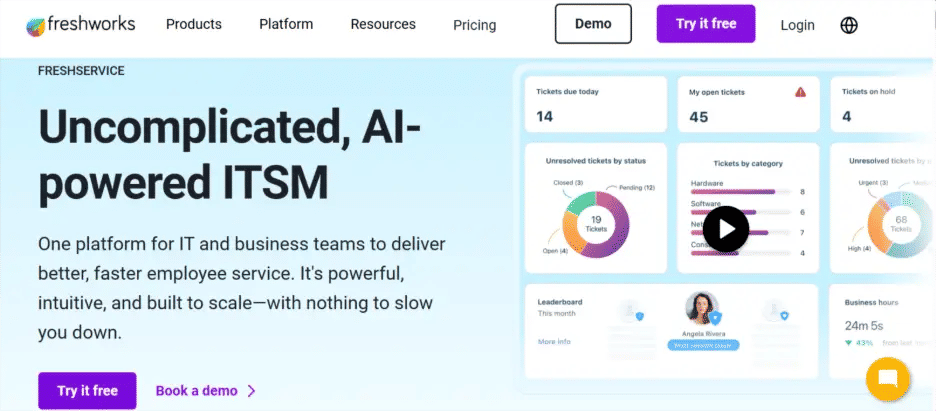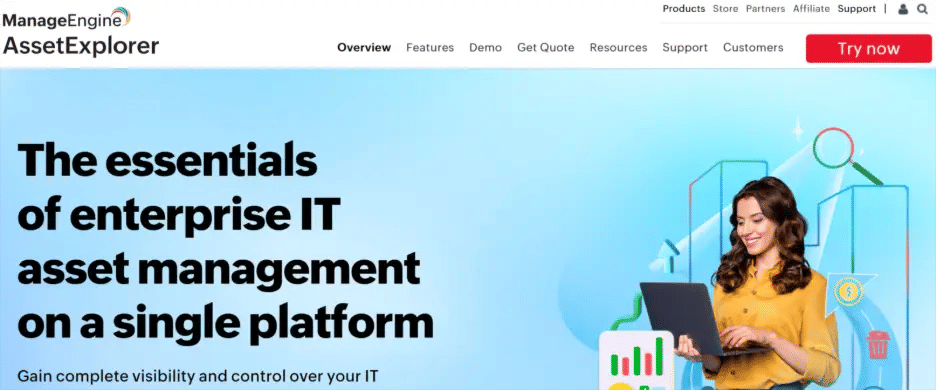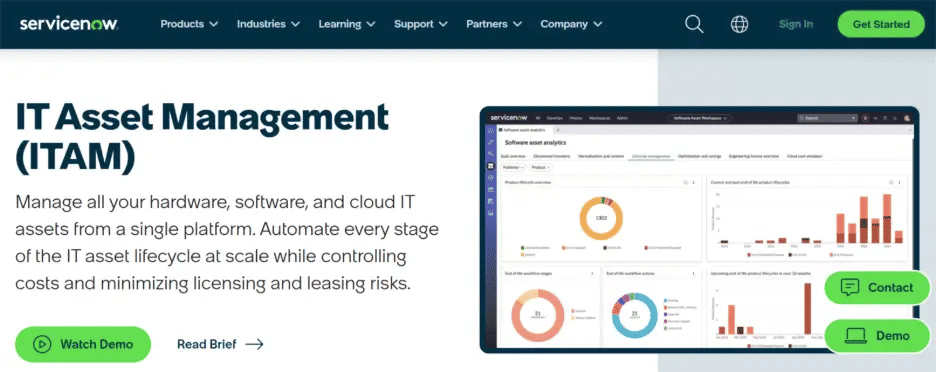
Comparing Leading IT Asset Management Tools: Features, Pricing, and Reviews
IT Asset Management or ITAM is the process of tracking and managing hardware and software across your organization. It helps reduce costs and avoid risks. In 2025, choosing the right ITAM tool is more important than ever. Businesses need smart tools to manage growing digital assets.
IT asset management tools track and optimize hardware and software, helping reduce costs and improve control. When comparing tools, consider features, pricing, and reviews to find the best fit for your team’s needs.
A good tool saves time and improves control. This blog will help you compare top IT Asset Management tools. We will look at key features pricing plans and real user reviews. Whether you are a small business or a large team, this guide will help you make the right decision. Let us explore the best options.
How We Compared the Tools Feature set and functionality
To help you choose the best IT Asset Management tool we followed a clear and simple comparison method. We picked tools based on real needs faced by IT teams. Below are the key points we used to compare each tool in this blog.
Feature set and functionality
We checked what the tool can do. This includes asset tracking license management reports alerts and mobile access. A good tool must cover the full life of each asset from purchase to disposal.
Ease of use and user interface
We looked at how easy it is to set up and use the tool. A simple dashboard and smooth flow help save time and avoid mistakes. Tools that need less training are better for teams with limited time.
Integration capabilities
Modern IT tools must work with other platforms. We checked if each tool can connect with systems like Microsoft 365 Azure ServiceNow or your helpdesk. Integration saves effort and makes asset data more useful.
Scalability and deployment
Your needs may grow. We checked if the tool works for both small and large teams. We also looked at deployment types. Some tools are cloud based while others offer on premise use for more control.
Security and compliance
We reviewed how each tool protects your data. We focused on industry standards like SOC 2 ISO 27001 and GDPR. This is important for teams that manage sensitive or customer data.
Support and documentation
We checked if you get fast help and clear guides. Good customer support can save your team during setup and future use.
Pricing transparency
We included only tools that show clear pricing. No hidden costs or surprise charges.
User feedback
We read reviews from trusted sites like G2 and Capterra to know what real users think.
Top IT Asset Management Tools Compared
Choosing the right IT Asset Management tool can help your business track devices reduce risks and control costs. Here is a detailed comparison of five top tools in 2025. Each tool suits different types of businesses.
This guide will help you decide which one fits your needs best.

Key Features
Asset Management 365 is designed specifically for Microsoft 365 users, offering an intuitive way to track both hardware and software assets. The platform enables businesses to manage the entire lifecycle of assets, from purchases and warranties to service history and disposal.
With built-in barcode scanning and detailed reporting, organizations can maintain accurate records with minimal effort. One standout feature is the ability to assign assets to individual employees or entire teams in just a few clicks, saving time and ensuring accountability.
Since the tool is embedded within SharePoint and Microsoft Teams, it integrates seamlessly with your daily workflows, making it feel like a natural extension of the Microsoft 365 ecosystem.
Ideal For
This solution is well-suited for small and mid-sized businesses that rely heavily on Microsoft 365 in their operations. Larger enterprises with established Microsoft 365 environments can also benefit from its scalability and ease of use.
For organizations already invested in Microsoft tools, it eliminates the need for separate, complex systems.
Pros
- User-friendly interface with minimal learning curve
- Deep Microsoft 365 integration for a familiar experience
- Quick and straightforward setup process
Cons
- Limited value for teams not using Microsoft 365
- Advanced reporting features are somewhat restricted
Asset Management 365 stands out as a practical and efficient tool for organizations that already depend on Microsoft 365. By streamlining asset tracking and management within the same environment where employees already collaborate, it reduces training needs and adoption barriers.
While it may not be the best fit for businesses outside the Microsoft ecosystem, its ease of use, integration, and one-step asset assignment make it a compelling choice for teams seeking a straightforward, reliable, and Microsoft-friendly asset management solution.

Freshservice, part of the Freshworks platform, combines IT service management and asset tracking in a single solution. Teams can monitor devices, link them directly to tickets, and automate repetitive tasks, making it easier to stay on top of both service requests and asset records.
With cloud-based access, it is especially useful for remote or distributed teams who need flexibility and quick visibility into IT operations.
Pricing Tiers and Plans
Freshservice offers multiple pricing tiers designed to suit different needs. Entry-level plans are budget-friendly, while more advanced tiers unlock additional features such as deeper automation, analytics, and integrations. However, costs rise as the number of users and feature requirements increase.
Target Audience
The tool is a strong fit for mid-sized IT teams that want a combined service desk and asset management platform. It provides structure for ticket handling while giving visibility into IT resources.
Pros
- All-in-one platform for service desk and asset tracking
- Extensive training resources available
- Powerful automation capabilities
Cons
- Higher pricing for larger teams
- Setup can be time-consuming
Freshservice is an excellent choice for teams looking to streamline IT support and asset management in one centralized, cloud-based system.

ManageEngine AssetExplorer helps IT teams track and manage assets without installing agents on devices. Its agentless discovery scans the network to identify hardware and software, ensuring accurate visibility of assets in real time.
The tool also monitors software usage and checks compliance with license agreements, reducing the risk of violations. With alerts for missing assets, pending updates, and potential compliance issues, teams can act quickly to stay in control. Its strong reporting capabilities further support audits and decision-making.
On-Premise vs. Cloud
AssetExplorer is primarily an on-premise solution, which suits organizations that prefer to keep IT asset data within their own infrastructure. While it offers limited cloud support, it remains most effective in traditional network environments.
User Feedback Summary
Users often highlight the tool’s robust features for compliance tracking and large-scale asset management. However, many note that the interface feels outdated and that effective use requires some IT expertise.
Pros
- Excellent for compliance monitoring
- Scales well for large networks
- Detailed reporting functions
Cons
- Not beginner-friendly
- Limited cloud capabilities
ManageEngine AssetExplorer is ideal for companies with large device inventories that need strong compliance tracking and detailed asset oversight.

ServiceNow is designed for large enterprises that need comprehensive control over their IT assets. It manages the full asset lifecycle, from procurement and deployment to maintenance and retirement. Teams can track changes, handle service requests, and manage support needs within one platform.
Its biggest strength lies in integration—ServiceNow connects seamlessly with its broader ecosystem, including IT Service Management (ITSM) and Configuration Management Database (CMDB).
Organizations can also design and implement custom workflows, allowing them to tailor processes to fit specific needs.
Pricing and Implementation Effort
As a premium enterprise solution, ServiceNow comes with a significant cost. Implementation often requires several weeks, along with skilled IT staff to configure and maintain the system.
While the upfront investment is high, the platform’s depth of features and scalability justify the expense for organizations that demand advanced functionality.
Best Suited For
ServiceNow is best suited for large companies with complex IT environments and dedicated IT teams.
Pros
- Rich feature set for enterprise-scale needs
- Highly scalable across teams and geographies
- Strong integration with other ServiceNow tools
Cons
- High cost of ownership
- Long and complex setup
ServiceNow is a powerful option for enterprises seeking advanced asset management with deep integrations and scalability.

Atomicworks is a free, open-source asset management tool designed for organizations that want flexibility and control. It allows teams to track basic asset data while offering complete freedom to customize the tool as needed.
Unlike commercial solutions, Atomicworks does not come pre-hosted—you must set it up and run it on your own infrastructure. This makes it appealing to teams that value transparency and control over their systems.
Community Support and Technical Complexity
Since it is open source, support is provided through community forums and online documentation rather than live customer service. Using Atomicworks requires IT skills to install, configure, and maintain the tool.
For non-technical users, the lack of direct support and the need for hands-on management can be a significant challenge.
Cost Effectiveness for Startups
One of the biggest advantages of Atomicworks is cost. There are no license fees, making it attractive for startups or small businesses that have technical teams and want to reduce expenses. The ability to adjust and modify the system also appeals to organizations looking for complete customization.
Pros
- No license costs
- Full control of system and data
- Highly customizable
Cons
- No dedicated support
- Requires technical expertise
Atomicworks is best for IT-savvy teams seeking a free, customizable asset management solution they can fully control.
Which Tool Is Right for You? For small businesses / startups
Choosing the right IT Asset Management tool depends on your team size your budget and the systems you already use. Each business has different needs. Below are clear suggestions based on who you are and what you need.
For Small Businesses and Startups
Small businesses often have limited budgets and small IT teams. They need tools that are easy to set up and simple to use. Cost is a big factor too. You want to avoid tools that take a long time to learn or need deep tech skills.
Recommended Tool: Asset Management 365
This tool is perfect for startups and small teams. It works smoothly with Microsoft 365. The setup is fast and you can start tracking assets in minutes. It offers a free 14-day trial so you can test it before buying. You get strong features without needing extra staff or big investments.
Why It Works
Simple setup Clear dashboard Affordable plans Built for small teams
For Mid-Market IT Teams
Mid-sized companies need more control over assets. They want better tracking reports and integration with other tools like helpdesk or email. Flexibility is key. The tool should work with your growing needs.
Recommended Tool: Freshservice
Freshservice is a strong pick for mid-sized IT teams. It brings asset tracking and helpdesk into one system. You can link assets to support tickets and automate tasks. It fits well with remote and hybrid teams.
Why It Works
All in one solution Good automation Fits teams with 50 to 500 users Quick access to help and support
For Large Enterprises with Complex Infrastructure
Large organizations often have thousands of devices. They need deep reporting strong security and custom workflows. They also need tools that follow compliance rules. These teams may also need to link the asset tool with other enterprise systems.
Recommended Tool: ServiceNow ITAM
ServiceNow is a premium solution made for large setups. It offers full lifecycle management from purchase to disposal. It connects with your change management and CMDB systems. Though it takes time to set up the results are worth it for big teams.
Why It Works
Very detailed features Best for complex networks Strong compliance support Trusted by global enterprises
For Microsoft 365-Focused Organizations
If your team uses Microsoft tools every day your IT asset tool should work well with them. This helps you avoid double entry and keeps your data in sync. You also save time as your staff is already trained in Microsoft tools.
Recommended Tool: Asset Management 365
This tool is made to work inside the Microsoft 365 ecosystem. It uses SharePoint and Teams. You can assign assets with one click using Active Directory. The setup is simple and it feels like using another Microsoft app.
Why It Works
Built for Microsoft users No need for extra logins Works inside SharePoint One of the easiest tools to use
For Open-Source Enthusiasts
Some teams want full control. They want to host the tool on their own server. They may also want to change the code and add new features. For them open-source tools are the best choice.
Conclusion
Choosing the right IT Asset Management tool depends on your business size your team skills and your current systems. Look for tools that are easy to use fit your budget and offer strong support. Some tools are best for Microsoft 365 users while others are built for large or technical teams. Always check key features and user reviews before you decide.
Most tools offer a free trial or demo. Use this chance to test the tool with your team. A good start can save time and cost later. Pick the one that meets your needs and helps you grow.
Join Our Creative Community
Frequently Asked Questions
What is the difference between ITAM and ITSM?
ITAM means managing hardware and software assets. It tracks purchase use and disposal.
ITSM means managing IT services like support and tickets. ITAM handles things while ITSM handles services.
Can I use these tools for software license management?
Yes. Most IT Asset Management tools help track software licenses. They show how many licenses you have and how many are used. This helps avoid overuse or fines.
What happens if I stop using the tool—do I lose my data?
No. Most tools let you export your data before you stop using them. You can keep records in Excel or move them to another tool. Always back up your data before closing the account.
How often should IT assets be audited?
It is good to audit IT assets every 6 to 12 months. This helps find missing items fix issues and keep records up to date. Some companies do audits every quarter based on their needs.

_eH2jDg7dZ.png)


_JiluXJRGNl.svg)























